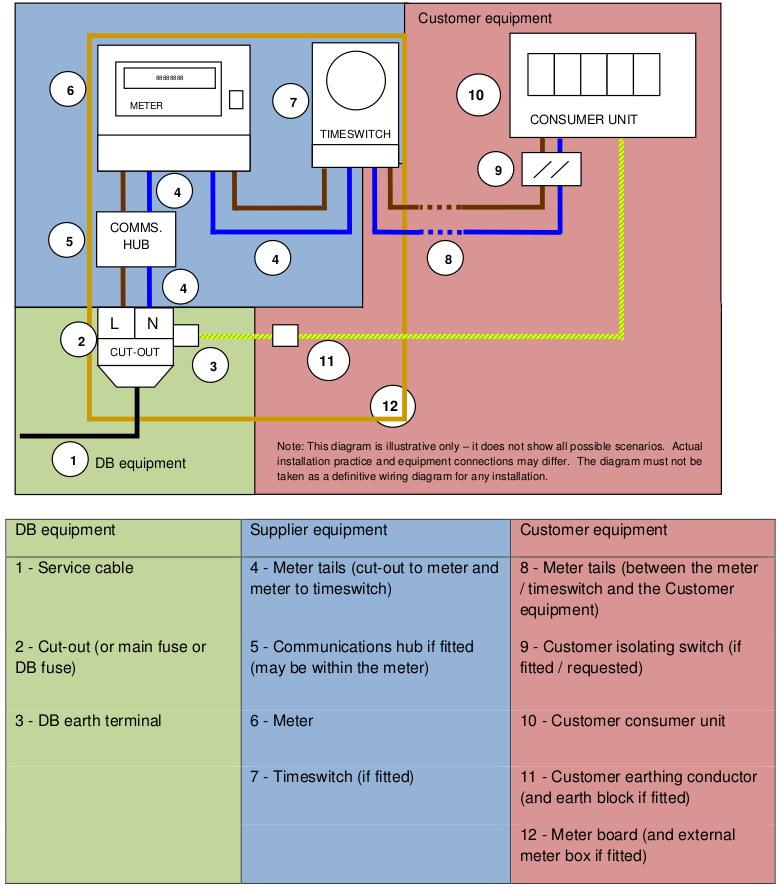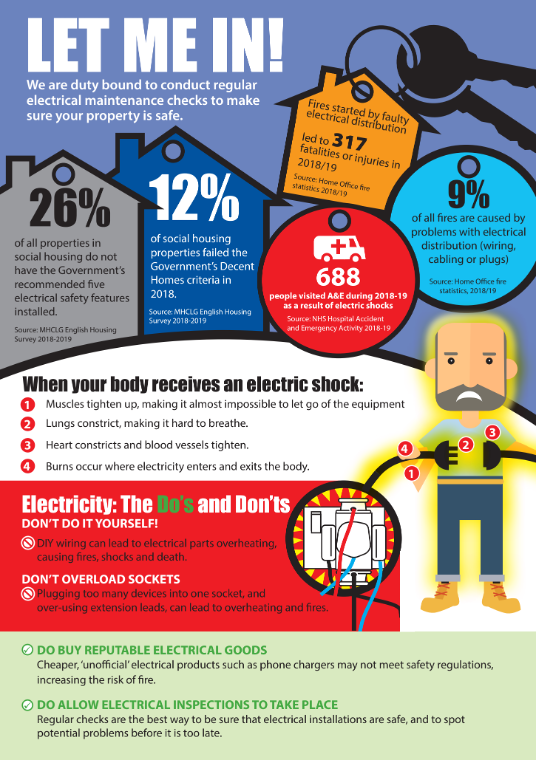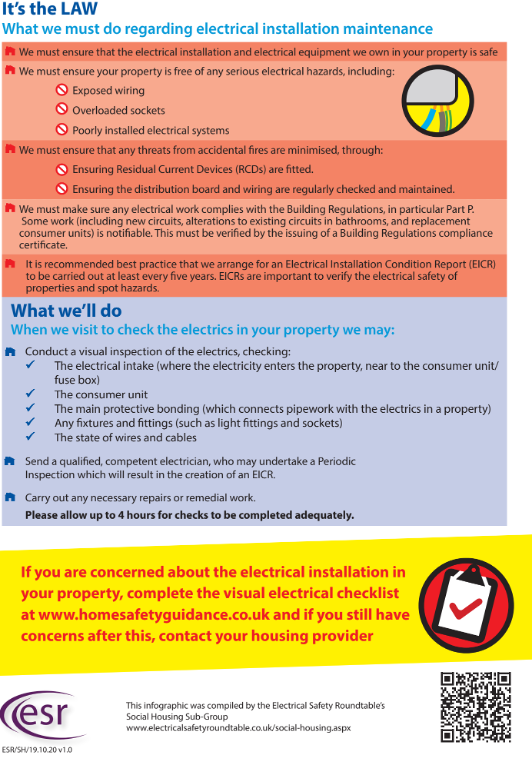Watch our fire safety video to find out more about preventing electrical fires:
Using electric heaters safely:
Electric heaters must be used carefully as the misuse of them can lead to fires.
Electric heaters should never be obstructed with any item, and this includes drying clothes. Covering electric heaters significantly increase the risk of a fire starting. Electric heaters will typically heat a small room in a short period of time, but they are not designed to be permanent fixtures in the home.
Tips to use portable electric heaters safely:
- Put your heater on a level surface, well away from anything or anyone that could knock it over
- Make sure your heater is at least one metre away from combustible materials, such as paper, furniture, or curtains
- Never use a portable electric heater to dry your clothes
- Don’t leave your heater unattended whilst in use or while you are asleep
- Never power a heater from an extension lead – they can easily be overloaded and cause fires.
- Regularly inspect your heater for damage and deterioration. If it is not in good condition, please do not use it
- Avoid second-hand heaters. Make sure you buy from manufacturers or retailers that you know and trust
- Make sure that you register your heater with the manufacturer so that, if there is a problem such as the item requiring a recall, they can contact you to repair or replace it
Electrical safety tips for your home:
Electricity is a common source of fires as well as serious injuries and even death. It is important that you keep safe by always checking equipment for common hazards before use. These checks don’t require any electrical knowledge or skill but can make a big difference to your safety and to that of those around you.
- Equipment - Check your electrical equipment for cracks, warping, scorching, discolouration or burns
- Electric heaters - ensure they are used safely as misuse can lead to fires. See separate section below for details.
- Cables - Check for damage, twisting or splits to cables and ensure they are not repaired with adhesive tape
- Environment - Check that the environment is suitable for electrical equipment, away from water etc. Look for signs of mis-use.
- Extension cables - check the plug, sockets and cable for damage and ensure they are untwisted before us. Never overload an extension cable. Watch our video here to find out more about how to use extension cables to prevent fires.
- Plugs and sockets - check for heat damage, loose or bent pins and broken casings
- Labels - check for a valid inspection and testing date if appropriate
- RCD devices - use the 'T' or test button to ensure these devices work to trip and disconnect the equipment.
Tampering with electricity meters
There have been increased cases of tampering with electric meters as people attempt to reduce their fuel bills by illegally altering their meters.
Tampering with your electricity meter is highly dangerous!
- Tampering with your meter can cause severe electric shocks and burns, and increase the risk of fire.
- Being charged with energy theft could also leave you with a large fine and a criminal record. In some instances, you could face up to 5 years imprisonment.
- Your insurance may not pay out if they have discovered your meter has been tampered with and your property has been damaged in the event of fire etc.
Who is responsible for which part of your electricity meter, fuse box and equipment:

Image from the The Meter Operation Code of Practice Agreement (MOCOPA)
Please note: DO NOT try to tamper with any of the equipment mentioned above, leave any electrical repairs to the relevant trained professionals. |
Your electricity meter, fuse box and equipment - who's responsible?
Your meter setup is made up of many parts, all owned and maintained by different people. Take a look at the diagram to the left to find out who is responsible for what.
We have listed below contact details relating to different parts of your equipment.
Parts maintained by your Distribution Network Operator (DNO)
If you have a power cut, or emergency damage to your Distribution Board supply equipment:
Call Electricity North West in an emergency on 105 for power cuts or damage to Distribution Board equipment. Phone lines are open 24 hours a day, 365 days a year, to be there to help when you need it most.
Alternatively contact Electricity North West on 0800 195 4141 and select option four to speak to their general enquiries team about your query. They are available Monday to Friday 9am to 5pm.
Electricity Supplier Metering Equipment
Please contact your electricity provider if your electricity metering equipment is damaged in any way, including a broken display.
Customer Equipment
If you have problems with your consumer unit (fuse box) or other customer equipment, as highlighted in the diagram:
You can report non-emergency repairs and book an appointment slot that is convenient for you on our self-service portal; MyMSV Account. You can report these 24/7 (even at the weekends) and on any device.
If you have an emergency repair that is needed, please call us on 0161 226 4211 so we can get all the details we need. Our out of hours service operates when the office is closed for emergency repairs, on the same number.
We will prioritise an emergency repair within 24 hours. An emergency is defined as something which could cause danger to health, residents’ safety, or serious damage and destruction to property.
Electrical Testing in your home:
It is recommended best practice that MSV arrange for an Electrical Installation Condition Report (EICR) to be carried out every five years. EICRs are important to verify the electrical safety of properties and spot hazards.
You can help this progress smoothly by undertaking the following:
- Allowing us prompt access to your home to carry out maintenance and electrical installation condition reports
- If you decide you want to install your own electrical fixtures, permission must be obtained from us, and any agreed works must be carried out by a competent NICEIC or NAPIT registered engineer. We must receive a copy of any relevant and required electrical certification from these agreed works
- Failure to allow our engineer or contractor access to complete any EICRs is a breach of your tenancy agreement and will result in legal action. This could result in us obtaining an injunction allowing us to force access or obtain possession of your home, any legal costs incurred will also be passed on to you
- If when undertaking the EICR we find a danger present and there is risk of injury, immediate remedial action will be carried out. Any other further investigation works, or remedial action may be undertaken later if it cannot be repaired immediately. The engineer or contractor will explain why they will need to return and what will happen next
To book or rearrange an Electrical Installation Condition Report, please email Gas.Team@msvhousing.co.uk










